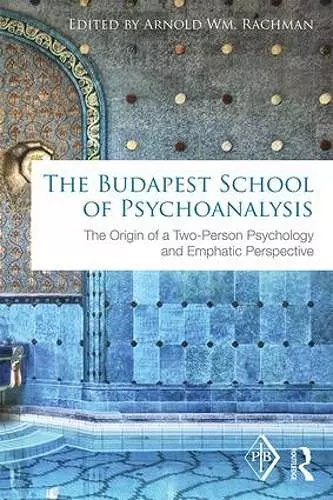The Budapest School of Psychoanalysis
The Origin of a Two-Person Psychology and Emphatic Perspective
Format:Paperback
Publisher:Taylor & Francis Ltd
Published:20th Jun '16
Currently unavailable, and unfortunately no date known when it will be back
This paperback is available in another edition too:
- Hardback£165.00(9781138195202)

The Budapest School of Psychoanalysis brings together a collection of expertly written pieces on the influence of the Budapest (Ferenczi) conception of analytic theory and practice on the evolution of psychoanalysis. It touches on major figures Sándor Ferenczi and Michael Balint whilst concurrently considering topics such as Ferenczi’s clinical diary, the study of trauma, the Confusion of Tongues paradigm, and Balint’s perspective on supervision. Further to this, the book highlights Jacques Lacan’s teaching of Ferenczi, which brings a fresh perspective to a relatively unknown connection between them.
The book highlights that the Hungarian analysts, influenced by Ferenczi, through their pioneering work developed a psychoanalytic paradigm which became an alternative to the Freudian tradition. That this paradigm has become recognised and admired in its own right underlines the need to clearly outline, as this book does, the historical context and the output of those who are writing and working in the tradition of the Budapest School.
The contributions to this volume demonstrate the widespread and enduring influence of the Budapest School on contemporary psychoanalysis. The contributors are amongst the foremost in Budapest School scholarship and the insights they offer are at once profound as well as insightful. This book is an important read for those practitioners and students of psychoanalysis who wish for an insight into the early and developing years of the Budapest School of Psychoanalysis and its impact on contemporary clinical practice.
"This superb new collection of chapters on the legacy of Sandor Ferenczi is a major contribution to the growing field of Ferenczi scholarship and to our understanding of the history and seminal influence of the Budapest school of psychoanalysis. Arnold Rachman has solicited outstanding contributions from some of the more prominent Ferenczi scholars in the international community, and provided us with a wealth of new information about Ferenczi’s influence on the field as well as the relevance of his work for contemporary psychoanalysis. This is a must read for anyone interested in the history of psychoanalysis and concerned about its future." - Jeremy D. Safran, Ph.D., Chair & Professor of Psychology,The New School for Social Research, Co-Founder & Co-Chair of the Sandor Ferenczi Center at the New School
"Arnold Rachman's combination of scholarly knowledge and practical experience as a psychotherapist makes this book both intellectually exciting and emotionally resonant, an invaluable contribution to the history of psychoanalysis." - Paul Mattick, Professor of Philosophy, Adelphi University
"This superb new collection of chapters on the legacy of Sandor Ferenczi is a major contribution to the growing field of Ferenczi scholarship and to our understanding of the history and seminal influence of the Budapest school of psychoanalysis. Arnold Rachman has solicited outstanding contributions from some of the more prominent Ferenczi scholars in the international community, and provided us with a wealth of new information about Ferenczi’s influence on the field as well as the relevance of his work for contemporary psychoanalysis. This is a must read for anyone interested in the history of psychoanalysis and concerned about its future." - Jeremy D. Safran, Ph.D., Chair & Professor of Psychology,The New School for Social Research, Co-Founder & Co-Chair of the Sandor Ferenczi Center at the New School
"Arnold Rachman's combination of scholarly knowledge and practical experience as a psychotherapist makes this book both intellectually exciting and emotionally resonant, an invaluable contribution to the history of psychoanalysis." - Paul Mattick, Professor of Philosophy, Adelphi University
ISBN: 9781138195219
Dimensions: unknown
Weight: 340g
222 pages